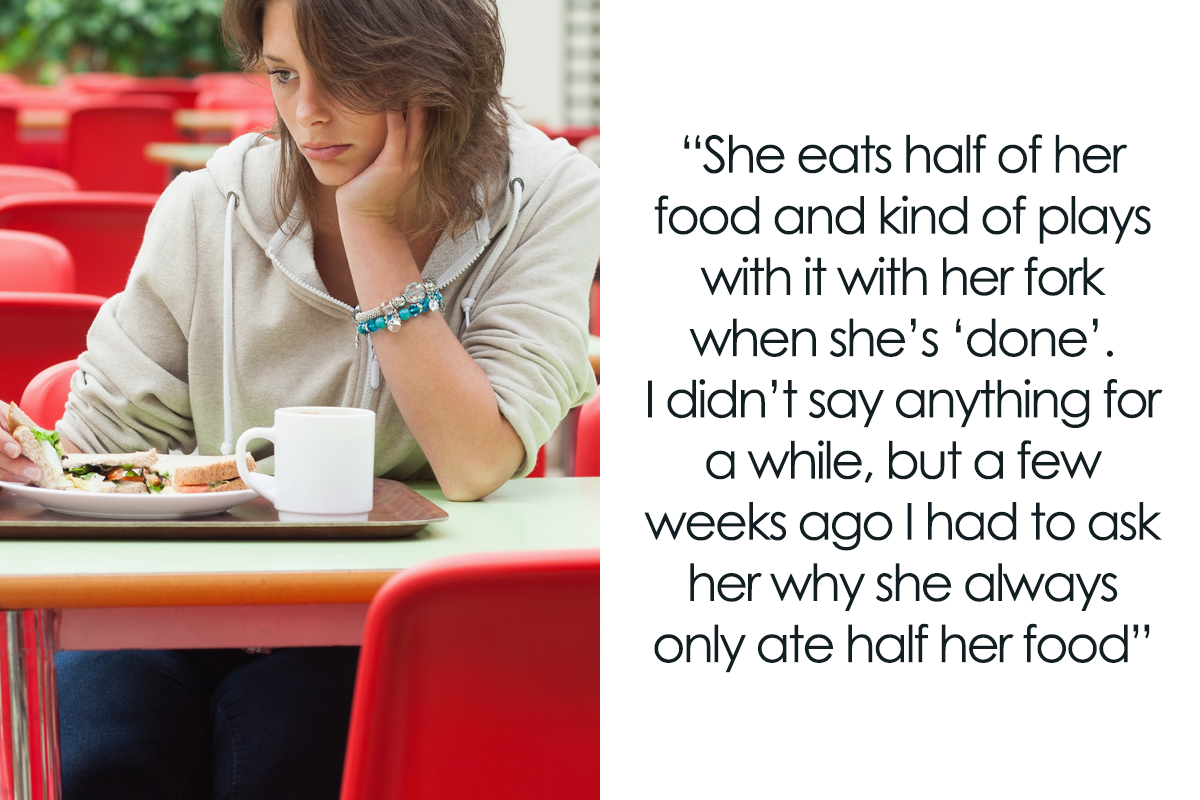
Woman Doesn’t Finish Her Food At The Dining Hall, This Student Thinks She Has The Right To Call Her Out
Respecting another person means respecting their personal boundaries. That way, you can have a healthy relationship with them. However, at some point, you might feel like they’re doing something wrong, and your first instinct might be to step in and correct them.
Not everyone is a fan of unsolicited advice. Especially when they’re being criticized by someone they barely know. Someone who doesn’t know the full story. Redditor u/throwaway0856742 recently went viral after sharing with the AITA online community how she confronted a fellow university student for ‘wasting’ food at the cafeteria. Things soon took a turn for the dramatic. Scroll down for the full story.
We wanted to learn more about why people are so quick to judge others and how we can help someone we suspect might have an eating disorder, so we reached out to Dana Harron, Psy.D. A licensed clinical psychologist and the founder of Monarch Wellness & Psychotherapy. Dr. Harron was kind enough to answer Bored Panda’s questions. Read on for her insights as to why public ‘interventions’ don’t work, how some individuals judge others to feel better about themselves, and why it’s important not to fall into the trap of judging those who judge others.
Bored Panda has also reached out to u/throwaway0856742 via Reddit, and we’ll update the article once we hear back from her.
A woman recently turned to the internet for a verdict on a delicate situation that happened at her univeristy
Image credits: Wavebreakmedia (not the actual photo)
She shared how she had confronted a fellow student about her eating habits
The situation quickly got out of hand
Image credits: trina1978 (not the actual photo)
The author of the post later had an update for everyone
Credits: throwaway0856742
The story proved that sometimes, it’s best to mind your own business, even if you think you have good intentions
Image credits: sloomstudio (not the actual photo)
Broadly speaking, there are very few genuinely evil people out there. Arguments, even dramatic ones, usually happen because there’s a conflict of interest. Or because good people have (seemingly) good intentions and might take the wrong approach. The vast majority of the people who read redditor u/throwaway0856742’s story told her that she was definitely in the wrong to confront the other student over her eating habits. One redditor put it succinctly: “Not your food, not your business.”
There are two main factors at play here in the story. The first is the actual approach the OP took. She cares a lot about not wasting food. It’s clear that this is an issue that she’s very passionate about. However, many readers felt that she was far too aggressive in her approach. Instead of being cautious, diplomatic, and friendly, she immediately started blaming the other student. The redditor was then shocked when the student enforced her boundaries and told her to ‘eff off.’
The solution, in this case, is to do things more subtly, gently in the future. And the redditor even wrote in an update in her post that she’ll apologize to the student when she next sees her. Clearly, she took the advice she got on Reddit to heart. However, this leads to the second issue.
Some readers thought that the woman completely missed what was actually happening in the cafeteria
Many readers theorized that the woman kept throwing away half her food because she might have an eating disorder. Or she might be dealing with a dozen different problems that aren’t immediately clear to strangers.
Someone who would take the time to talk to her and get to know her would find out what the real reason was. The OP assumed this was a food waste issue when it might have been something else entirely. Most people would probably agree that someone’s mental and physical health are more important than her binning half her meal.
The real motivation for judging others can sometimes be rooted in self-interest
Image credits: micens (not the actual photo)
According to Dr. Harron, the founder of Monarch Wellness & Psychotherapy, many people are quick to judge others because they feel insecure within themselves. “It may take the guise of ‘wanting to help,’ but the real motivation can actually be quite self-oriented,” she told Bored Panda that there’s sometimes a selfish element in these situations.
“Rather than really wanting to improve the situation, the goal of getting involved in a circumstance like this can be to feel one-up on someone that you can perceive as one-down. People who judge often unconsciously see the world as a hierarchy, and rank people accordingly. So if another person is moved down a peg, you feel that you are moved up,” the clinical psychologist explained that some people see the world from a zero-sum game perspective.
There are plenty of possible reasons why somebody might throw away their food
The expert pointed out that there can be many reasons why someone throws away their food uneaten. For instance, they might have gastrointestinal issues. Or their food might be spoiled. It’s hard to determine the exact cause without speaking to the person!
“I worked with someone who didn’t want to eat their packed lunch in front of peers because the family was from a different culture and the peers, unable to tolerate difference and looking for an excuse to offload their own sense of inferiority, gave this person a hard time about their ‘weird’ lunches,” Dr. Harron shared just how varied these reasons can actually be.
“One possibility could be that someone is struggling with an eating disorder. If you are concerned that someone you know might be struggling with an eating disorder, offer your perspective in a private and respectful way. Do not attempt an ‘intervention’—this doesn’t work and often just makes people feel shamed.”
Instead, it’s best to share your thoughts and feelings when you’re alone with the person. And if and only if they seem receptive.
“Keep focused on yourself by using ‘I’ statements—‘I feel concerned about your eating’ or ‘I am worried when I see you not having lunch.’ Give the person an opportunity to talk and listen respectfully to what they have to say. The goal here is not to change their behavior but to tell them how you are feeling. If the person in question is young, also share your concerns with their parents or other involved/trusted/caring adults,” Dr. Harron advised on the best approach.
We should all be careful of being quick to judge those who judge others as well
Image credits: Liza Summer (not the actual photo)
According to the clinical psychologist, there’s something vital that we all have to be aware of when judging other people. Dr. Harron calls it ‘the gobstopper of judgment.’
“Judging other people’s judgmentalism is a huge trap, and an easy one to fall into,” she told Bored Panda. For instance, someone might smile and pat themselves on the back for their “zen-like acceptance of others” while saying how glad they are that they’re not as judgmental as the people in the story they’re reading about online.
In other words, we really have to be careful about how we judge someone we know barely anything about. For example, the woman judging the student who throws out her food might come from a background of food insecurity.
“Maybe, like many of us, she is besieged by eco-anxiety and doesn’t know where to put it. Maybe she is actually being judgmental—which would mean that her ability to feel good about herself has lapsed (not surprising in our culture that teaches people that feeling good about oneself is usually at the expense of others) so she’s reaching out for whatever works—just like anybody else in that position would do and just like we all have done from time to time.”
In short, the world isn’t black-and-white, and there can be a dozen different reasons why somebody does what they do. It’s essential that we don’t oversimplify these situations into simple stories about outrage.
Dr. Harron is the founder of Monarch Wellness & Psychotherapy, the author of Loving Someone with an Eating Disorder, and has recently written a blog post about judging others on Psychology Today.
When dealing with eating disorders, it’s best to reach out to seasoned professionals for help
There are many different eating disorders. The most common ones include anorexia, bulimia, binge eating, pica (i.e. eating things that aren’t food), rumination, and avoidant/restrictive food intake disorder. Each particular disorder will have its own set of symptoms.
However, generally speaking, some of the mental and behavioral signs that might indicate someone might have a disorder include dramatic weight loss, a preoccupation with weight and calories, concern about eating in public, a fear of gaining weight, severely restricting the type and amount of food eaten, and avoiding meals.
Meanwhile, some of the physical signs of a potential disorder include the person feeling dizzy, fainting, having difficulty concentrating, dealing with stomach cramps, feeling cold all the time, having weaker muscles, and having a poor immune system.
Tackling eating disorders doesn’t have to be done alone. It’s recommended that you reach out to competent professionals who have a background in dealing with these sorts of issues. The three areas that you need to tackle include medical, psychological, and nutritional care.
So, for example, a medical doctor who has experience with anorexia patients can make sure that you’re doing all right, physically. Meanwhile, a mental health professional with a background in eating disorders can make sure that you’re taking care of your physical and emotional well-being. Finally, consider reaching out to a qualified nutritionist who can help change your relationship with food, as well as your outlook on what your body actually needs.
The woman argued with the people who read her story. Here’s what they had to say
211Kviews
Share on Facebook'She's kind of quiet, but when she finally talks she seems normal'. Hold up. I don't need to read anymore. YTA.
Yeah, I couldn't read it all, either. The OP exudes mean girl vibes.
Load More Replies...Wow, this girl is not only self centered and rude but just ok plain dumb. She needs to learn to read the room and also to mind her own business. No one wants her “advice”. What a sicko
She didn't even have to read the room. The other girl plain told her to not comment on her eating habit. What an obnoxious and immature brat. But, well, at least she accept the verdict.
Load More Replies...This person still didn't learn their lesson. Even after acknowledging that they were the ahole they then proceeded to say that next time they'll be nicer about "educating" people on wasting food. What a twat.
Agreed. They didn't learn at all. Instead of taking away that they shouldn't talk s**t to people when they don't know what's going on, they just took away that they should be nicer about it. Which is progress, I guess? But still entitled and judgy.
Load More Replies...For 40 years I have had this problem. Having problem finishing of my plate, especially in public/ with people around. It is the feeling of people are looking at me when I am eating that disturbs me and any kind of comments makes it soo much worst.
Yes! Same here. See my comment below. I have the exact same problem. My parents always thought it weird I could never finish my plate and eating in public is so damn hard.
Load More Replies...I don't understand how some people are just so blind to the fact they're a massive c**t and think the problem is with other people...even when the internet told her she was still arrogant as f**k about it all.
Her responses are appalling. She sounds spoiled, selfish, arrogant, and entitled.
Load More Replies...It's the attitude of "It's wrong to waste food, therefore I am right to hassle people about it" that really rubs me the wrong way. Like the guy at a cafe I was at hassling someone for taking a plastic straw, even though the person taking the straw explained they have fine motor control issues and can't hold and sip from a cup. But no, this dude was In The Right and therefore a d**k about it. We're all just doing the best we can, and a little softness and empathy goes miles.
Maybe he should go harass the big plastic companies instead.
Load More Replies...Definitely an eating disorder. I do the exact same thing and I have an eating disorder. It's probably compounded by eating in front of other people. That gets me too. Something about being seen and watched while eating just makes it harder. The OP just took someone who is vulnerable and made it so much worse. Anorexia nervosa is a nasty beast.
I have atypical anorexia (im still fat even though I struggle to nourish). Anorexia is terrible.
Load More Replies...*Love* how even at the end she still says "it was the same as giving advice"... DON'T GIVE UNSOLICITED ADVICE!
For once, the admission of OP being TA doesn't really redeem them. This attitude, god. Also bro someone's leftovers from this buffet-like cafeteria is not making food waste. Everything left over will get chucked out at the end of the day anyway
Yeah, definite case of yta. Eating habits are a very private thing and even if she were a very close friend or a family member, it's a subject where it's best to tread lightly. As an acquaintance, persistently questioning her eating habits and continuing even when asked to stop is a huge invasion of privacy and plain nasty.
As someone who always ate her lunch discreetly in the bathroom at school and even now as an adult still escapes to an alley with her sandwich during lunch break at work: Well done. The girl you harrassed will now probably never enter the cafeteria ever again. I admire her balls to even go sit there with her food in the first place; something I've never been able to myself. But good job, scaring her off like that. >__<
Even when the OP admitted being in the wrong she still managed to lash out at all of us for calling her on her atrocious behavior. I wonder what her major is at University...? Awful person.
She's a judgmental twàtwaffle. One of these days she's gonna pull this garbage on the wrong person, and they're gonna rip her to shréds, literally, figuratively, or both...and she will deserve it.
Firstly, twatwaffle just gave me my first laugh of the morning over my coffee...I forgot that was a term and now it's the ONLY thing I'll use today. Also, I dare this twatwaffle to come after me for anything-I'm not in college, honey, so try that with my hardened 42 year old working single-mother a** and see if you walk away with a face :D
Load More Replies...For sure massive a*****e!!! Firstly going on about how quiet she is & when she does talk “she seems normal” what the hell? Then the asking her intrusive questions like it’s your business. Go f*ck yourself. Clearly you had a problem with her from day dot & you were looking for a reason to pick a problem with her in hopes of making her uncomfortable & humiliating her in front of all your buddies. It’s not even the suspected E.D. I happen to eat very slow & have had people constantly comment on it, why are you watching me eat? That’s weird as f*ck.
I was instantly reminded of that quote along the lines of “everyone around you is engaged in a private battle you know nothing about; please be kind.” A person could be lost in thought thinking about a relative’s death, or contemplating her own, or any of a million things that might have NOTHING to do with food, but that’s the time and place where she goes through it.
I have a fast metabolism and appetite problems, it's nearly impossible for me to eat my full. If I try to force myself to eat when I have no appetite I just end up gagging. I have trouble not losing weight.
About 5 years ago I started taking an anti anxiety med that made me nauseous. My stomach shrank because I wasn't eating as much. To this day I still have trouble judging how much food to take in a buffet style setting. She's an AH
An acquaintance of mine had a condition she described as 'imagine you're standing at a sink. One faucet handle is 'ravenously hungry', and the other is 'can't eat another bite'. Turn them both on full blast, and that's me.' She understandably had a hard time judging serving sizes because she felt very hungry when filling her plate, but when she started eating, it was a struggle to keep going.
Load More Replies...Can you imagine the horrors to being married to the OP? You didn't fold the towels right! You missed a spot when you were cleaning the toilet. Can't you do something with your hair? You need to lose a few pounds. Your not wearing THAT are you?
There's a diet that was popular years ago whereby you deliberately ate only half of what is on your plate. The girl may have a parent or relative that did this and it caused an eating disorder for her being in the company of someone who constantly twattled on about how females should only need half of what typical serving sizes provide yadi yada ad nauseum. I say this because my own sister has this exact attitude and does all the ridiculous diets as they become trendy, every time. Anyway, I have an eating disorder, however because I am mule headed stubborn about being battered into following trends I just won't, instead I over eat in rebellion. So many ways to catch food issues, I feel sorry for this girl however she caught hers, OP needs to be drop kicked into a ravine.
At my university we got our plates served by the cafeteria staff, usually it was way too much for me. After forcing myself to eat it all anyway because I was raised to always eat what's on my plate (not a healthy approach imo), at some point I just started to take a snack box with me to take half of the food home for the evening. That was great for my eating habits and my budget. I wonder if something like that could work with that kind of an eating disorder.
College cafeterias don't work like that anymore. Everything is all you can eat. The they no longer talk about the freshman 15, it's now the freshman 40.
Load More Replies...YTA - Clearly an entitled, un self aware, bullying, non-empathetic, clueless AH
I had a "friend" who kept shaming me for not eating because it's her culture or whatever. Cultural norms and one's perception of manners are not an excuse to disregard serious issues people are facing.
This is like walking up to a stranger and telling them to smile and demanding an answer why they dont smile. Like wtf none of your business.
One of OP's replies was along the lines of "I thought I was giving advice like telling smokers they shouldn't smoke" uh that's not giving advice, that's sticking your nose into other people's business and likely telling them something they already know in a super condescending gross way. Nobody appreciates that kind of "advice" and it's basically just an excuse to be judgmental and rude. Yikes dude.
OP is definitely creepy and wrong. However, everyone is jumping to eating disorder, which absolutely may be true, but the university dining halls I've been too (when visiting colleges with my kids), the dining hall staff puts the food on your plate even when it's a buffet, so she just may want a variety of foods but they heap big servings of each item on her plate.
That's a good point. OP claims that it isn't like that, but I have doubts. Both universities I went to always gave you way too much food when it came to portions and there wasn't an option for a smaller portion.
Load More Replies...I have trouble eating in public. It’s not so bad now but when I was younger the thought of people seeing me eat would turn me off my food and when I’d attempt to eat something, because, y’know, need food to survive, I’d throw it back up. A noisy, busy environment like a cafeteria seems like the sort of place so many would have trouble eating a full meal…
It may not be ED, there are lots of other things. My BF used to have an ulcer and sometimes, most times, it would bother him during a meal and he'd have to slow down and wait to see if it settles before he could eat the rest of it or have to eat very slow. Lots of times he couldn't finish and he was very skinny for a while because he couldn't eat enough even though he tried. Thankfully he's fine now.
“Perhaps” your intentions were good, “perhaps” she has a eating disorder “perhaps” she has some personal problems “perhaps” she is going through some emotional problems “none” of which you know about “none” of which are your business. “Perhaps” you should get to know her more “perhaps” you shouldn’t BARF your unwanted opinions all over her. That a lot of perhaps.
YTA I had something similar happen at work. I work at Amazon in the warehouse doing problem solve on packages that have been damaged or lost or need to be repacked sometimes very dirty work a lot of wet damage from broken bottles and cleaning supplies. Therefore I wear old clothes to work usually jeans and tshirts and same ones over again through the week. I do wash them between wears. Had a co worker that I barely know come up and confront me about not dressing up and looking nicer and asked if I enjoy looking like a slob at work? Like seriously what???! Why would I ruin nice clothes by wearing them in a filthy warehouse? And why is it their business anyhow? Everyone on ship dock dresses just like me me.mfeelings for a moment
Jesus rollerblading Christ that was so rude and unnecessary. I'm sorry they did that to you.
Load More Replies...The OP is a mean girl bully, but trying to come off like the good one. This is how I was bullied by the girls in pretty much every school. The girl the OP is harassing is uncannily similar to how I was in school, where I was very much in my head, filled with imagination and had stories and fantasy scenarios. I must be a strong imaginer so lost in thought that I act out, or start muttering aloud. People would come up to me, interrupting my play, asking me the same things the OP asked this girl time after time. I would no longer feel comfortable being in certain spots for lunch, spares and recess, or anywhere else after school that put me at other's attention. I could feel people staring and snickering. I minded my own business. Not sure what's so hard about that. Sometimes I would act out movies, especially with ASMR moments that I always felt satisfying. The Secret Garden being one of them, where the girl puts the key into the garden lock with all the vines and branches rustling.
I loved hearing show soles on stone paths, and hearing skirts rustling in middle earth movies. In winter, I would be enamoured with the sparkly snow and the icy snow mounds. I'd be pretending I was a giant snow queen walking along snowy, mountain peaks. Or a snow fairy. Just me in my head. Then someone comes along interrupting my flow asking why I'm walking up and down one area or walking seemingly aimlessly around a field, saying I should be with the other kids and this is why I'm " a loner". Just mind your business. There should be nothing odd about daydreaming and acting out what's going on in your imagination. There was a point in Junior High some girls were spreading a rumor I was anorexic or bulimic because I started going home for lunch. Wasn't true at all. But it was brought to the teacher's and principal's attention, and then they called my folks who believed these rumors even though I would eat heartily at home and they were always complaining about me eating too much food. My mom is always telling me "your eyes are bigger than your stomach" because I pile food on my plate, I want to try something of everything, and then just get full faster than I thought I would. Just mind your business.
Load More Replies...YTA. I have food insecurity, and DO get upset when people waste food, but I've never confronted anyone outside of my direct household about it. (We use food stamps in my family, so we're very particular about if food gets wasted.) It's none of my business why there's a half-eaten piece of pizza in the trash, or why someone didn't finish eating their chicken. It's unfortunate, but it is what it is. We don't have a food shortage. We, as a species, throw away so much and waste so much. It is what it is. The pizza could have fallen on the floor. The chicken undercooked or past expiration and served. You have no idea, and it's none of your business.
She's hopeless. Even if half of it was for the girls imaginary grouch in the cafeteria trash it's none of her business
OP is a POS. Their 'edit' is arguably worse than their initial transgression.
If I was having lunch and someone I barely knew walked up and told me that they have spent multiple days watching me eat, I would be incredibly creeped out. Of course she told OP to f*** off, anybody would!
Why is any of this the OP's business? Initially I thought OP was concerned that the girl may be eating too little, or have a disorder. But no, OP has immediately come to the judgement that the girl is wasteful and has no manners. And then has the audacity to wonder why she no longer shows up at the cafeteria...
I can't speak for colleges, but in the military that set of eating behaviors would not fly. We were taught discipline, "Take all you want, but eat all you take". Again, apparently colleges are a different environment. Also, do we have direct evidence or testimony she actually did have an ED?
Well I can sleep better tonight knowing the self-appointed food justice warrior here is making sure no one wastes their tater tots!
So we have a girl with a probable eating disorder, has been brave enough not only to come into a cafeteria but also sit with people when she probably just wants to hide in a corner.....and has been driven away by this numpty. I hope the girl is ok.
Oh my god. This person shouldnt have friends. They’re insanely disrespectful.
Def the AH but what is most disturbing is how u kept calling the girl rude when YOU were over the top rude.
I can't even believe this is a real story- it's just too ridiculous and rude. It doesn't matter whether or not she has any food issues...it's none of her business. And then to keep mentioning it! Just unbelievable...
The OP is TAH. I'm sure that the student isn't the only one wasting food but the OP just seemed to be obsessed with this specific person. And the way she answered the comments just made me think she was a complete and utter a*****e. I don't think she learned anything, imho.
OP YTA....It's none of your business how she eats her food. You didn't pay for it, therefore mind your own business.
I have a restrictive ED. I'll be hungry af and then sit down to eat and get early satiety. I know how much I should eat and I want to eat, but my body brain says no. I'm loot that girl in the cafeteria except I wouldn't hold back on telling the OP off.
What I love about this, is that this "mean girl", who for all their protestations still sees themselves being in the right, is getting shredded on not one, but two social media platforms :)
Instead, try asking her, "Hey, you didn't finish, do you feel okay?" and add "I think the (whatever item) isn't too great, either." You might save a life. If you've gotten to college/uni without encountering a word about eating disorders.... Yu were NOT paying attention (yelling that one at the OP). Good grief, what a self-centered force for evil that OP comes off as. "How dare they say I'm wrong! I'm saving the world!" No, biatch, you just outed someone who needed a friend, not a Karen.
she basically said If the girl was fat she probably wouldn't have mentioned it smh
so basically op says: "it's not an eating disorder because she doesn't look like she needs to lose any weight to me" yea, yta. eating disorders don't work like that. an anorexic person can be skin and bone, dangerously, fatally even, underweight, and yet they will still insist they're not, and that they must lose weight. My old neighbours daughter went through it a good few years back, it's not a nice thing to see anyone witness, and if you don't know them well, it's best to stay out of it or at the very most, in a case like this, mention it to the uni's counsellor or something anonymously.
Woah, beside the fact that the OP is majorly YTA... I also want to highlight that normal portions (like they got served in European restaurants, where doggy-bagging it is mostly seen to be the exception/being rude) can be to much. Okay! I get it that the restaurants also have to cater for the tall and heavy weight John Doe. (Nothing wrong about that.) But I'm, also struggling with some unhealthy eating habits in my youth, have turned out to be a frequent eater. Having a split breakfeast (munching on a variety of things), before having a warm lunch break to then gobbling up some other snacks in the afternoon to have a warm dinner late at night. (It works for me and I'm not overweight/having health issues). But everytime I'm presented with a full meal at a restaurant, I've to find excuses why I've only ate half of it and also justify to my colleague, who know that i like to eat and this constantly, why I'm not finishing the served portion.
Yep , you're the a*****e , yes wasting food isn't good but do you go round restaurants, cafes etc and start in on them. If the girl was paying for her own food it's damn all to do with you whether she finishes it or not. I don't like food waste either because we all know there are millions who go without. Its not like she could parcel her food up and send it anywhere!!! Mind your own business , the girl maybe tried to set a goal to eat more but couldn't do it,,she could have some sort of eating disorder or fear. You certainly didn't help ,no wonder she got defensive
Wow, what an a$$hole. It doesn't matter why that other girl doesn't eat her food. It's super weird and rude to comment about other people's eating habits. Less food waste is better, but harassing random people about it and being a stalker like that doesn't accomplish anything except showing everyone what an a$$hole you are.
Please don't downvote when others make a normal comment. Have a nice weekend !!!
The more you ask the trolls not to downvote, the more they do it.
Load More Replies...This looks like someone struggling with disordered eating and possibly social anxiety. Someone who has now been shamed and bullied by OP to the extent that they don't feel safe eating in the dining hall. OP, it is absolutely none of your business what other people eat, or don't eat, and how. Absolutely YTA
omg the replies she makes to judgements! :D I'm dying of laughter, but also also wow SITA. "For me it's like giving advice, like telling someone they should probably stop smoking" JFC she's right some people are raised on houses without manners and hers is obviously one of them. I'd like to see her try and give my 42-year-old butt "advice" on anything. Whip out ya phone and record me laughing my a** off in her face and telling her she can go f*** herself sideways with her "advice"
You sound like a bossy, know it all douche and it's really none of your business..
Even though she recognizes that she was in the wrong, she STILL seems determined to make mention of it. She doesn't seem able to KEEP HER MOUTH SHUT! (ie: she's gonna be a real Karen as she gets older)
This is acting like a young child, commenting and asking impolite questions about things they see.
I used to drink a lot of soft drink. I stopped a year or so back, but I'd occasionally get comments and would shut them down pretty quickly, but politely. "I'd rather not talk about my choice of food and drink, thank you" . And as for this post, you can't tell me that it's not a troll post.
Who in their right mind thinks that harassing someone is the same as giving advice? And even if she was genuinely trying to help, if you’re giving advice to someone without knowing a single thing about their situation or what the actual problem is then your advice is completely useless
NTA imo. I would have commented if I saw someone wasting food every day. It's not like she attacked her. And the ED excuses seem to be just that. An excuse to bully the "bully".
Why does she even care if she's wasting food like they was struggling to feed all the students and that she'd personally paid for herself? Then claiming to not study food disorders well neither do almost people but we are dumb as s*** to just think someone's doing that for the fun of it. And she's so mean and rude like I don't even know how she has friends. What a b****
YTA. Obviously, her parents didn't teach her any manners to mind her own business. As long as the girl paid for it she can wear it if she wants to. If you're so worried about food getting wasted then maybe get a job in the cafeteria and you can regulate how much food students get for lunch.
This girl is very very rude and insensitive and I find it hard to believe that anyone actually sits with her at lunch! The other girl should have used her left over lunch to throw at this AH!
Op is a mean girl looking for a victim. She'll move on to somebody else now. Sad.
YTA. Its absolutely none of your business how someone else chooses to eat. You talk about good manners and yet you show the worse of manners by telling her off for something that is her personal choice. I hope she complains about you to the college as you out and out bullied her. Badly done on your behalf
I find it amazing that people can actually put all this in writing, probably edit it a couple of times, and never realize they were in the wrong. She actually thought it was her business because that girl sat at her table? This OP sounds like a cliche popular girl / bully.
Wow if that was me and this girl started asking me over and over I’d do more then tell her to f**k off. How ridiculous. People really get brazen being little karens I guess.
This woman's behavior is exactly the reason why I still, to this day at age 43, only eat in the middle of the night in secret in my bedroom so nobody can watch me or say anything to me. I'm downright phobic about it. Thanks to one comment from my mom when I was 9 that kicked off a lifelong eating disorder. Don't ever remark about someone else's food please.
Watch out people. This is what the future is looking like. It has reached tipping point. Too many of these self justified tools. This girl is a straight up bully. Or if not then so astoundingly clueless I am surprised she had the admission score for higher education. Mind you. These are the sort of narcissistic idiots that go straight to the top of the food chain of CEO or politician.
By your response you still didn't learn anything. Mind your own business. You sound like a bully. Don't apologize to her next time you see her do it now. Take a good look at yourself before you have no friends.
How old is the OP anyway?! She sounds like the school bully who never grew out of it. Toxic individual, to be avoided at all costs!
I would love to call you an as shole but what your really are is a self absorbed fu cking cu nt of a person.
I don't gave an eating disorder and I don't study eating disorders either but I instantly knew this might be the case. YTA because you only ever think of the world through your lens. And what is the problem with playing with food? Is she throwing it like a toddler or is she just fiddling with it. Control issues much?
I know they won't see this but not only are there eating disorders out there but medications that also prevent hunger or make you suddenly feel sick there are multiple reasons even something small such as got to overwhelmed by the choices of food buffet style can be overwhelming so maybe they struggled to.choose wt to eat so many reason so little care or empathy. She's becoming a Karen before our very eyes
Who savagely criticize every fault, real or imagined, that they see in others while being completely oblivious to their own.
Load More Replies...Except she didn't really learn. She just doubled down on being "right" about food waste and said she would explain nicer in the future instead of just learning to keep her mouth shut. She also decided to argue with everyone who disagreed with her despite soliciting their opinions.
Load More Replies...That's the thing, though. That girl probably has an eating disorder, and I am pretty sure she WANTS to eat all the food, but physically CAN'T.
Load More Replies...Are you the OP? Cause you seem. just as wrong, self righteous and insufferable as the OP
Load More Replies...'She's kind of quiet, but when she finally talks she seems normal'. Hold up. I don't need to read anymore. YTA.
Yeah, I couldn't read it all, either. The OP exudes mean girl vibes.
Load More Replies...Wow, this girl is not only self centered and rude but just ok plain dumb. She needs to learn to read the room and also to mind her own business. No one wants her “advice”. What a sicko
She didn't even have to read the room. The other girl plain told her to not comment on her eating habit. What an obnoxious and immature brat. But, well, at least she accept the verdict.
Load More Replies...This person still didn't learn their lesson. Even after acknowledging that they were the ahole they then proceeded to say that next time they'll be nicer about "educating" people on wasting food. What a twat.
Agreed. They didn't learn at all. Instead of taking away that they shouldn't talk s**t to people when they don't know what's going on, they just took away that they should be nicer about it. Which is progress, I guess? But still entitled and judgy.
Load More Replies...For 40 years I have had this problem. Having problem finishing of my plate, especially in public/ with people around. It is the feeling of people are looking at me when I am eating that disturbs me and any kind of comments makes it soo much worst.
Yes! Same here. See my comment below. I have the exact same problem. My parents always thought it weird I could never finish my plate and eating in public is so damn hard.
Load More Replies...I don't understand how some people are just so blind to the fact they're a massive c**t and think the problem is with other people...even when the internet told her she was still arrogant as f**k about it all.
Her responses are appalling. She sounds spoiled, selfish, arrogant, and entitled.
Load More Replies...It's the attitude of "It's wrong to waste food, therefore I am right to hassle people about it" that really rubs me the wrong way. Like the guy at a cafe I was at hassling someone for taking a plastic straw, even though the person taking the straw explained they have fine motor control issues and can't hold and sip from a cup. But no, this dude was In The Right and therefore a d**k about it. We're all just doing the best we can, and a little softness and empathy goes miles.
Maybe he should go harass the big plastic companies instead.
Load More Replies...Definitely an eating disorder. I do the exact same thing and I have an eating disorder. It's probably compounded by eating in front of other people. That gets me too. Something about being seen and watched while eating just makes it harder. The OP just took someone who is vulnerable and made it so much worse. Anorexia nervosa is a nasty beast.
I have atypical anorexia (im still fat even though I struggle to nourish). Anorexia is terrible.
Load More Replies...*Love* how even at the end she still says "it was the same as giving advice"... DON'T GIVE UNSOLICITED ADVICE!
For once, the admission of OP being TA doesn't really redeem them. This attitude, god. Also bro someone's leftovers from this buffet-like cafeteria is not making food waste. Everything left over will get chucked out at the end of the day anyway
Yeah, definite case of yta. Eating habits are a very private thing and even if she were a very close friend or a family member, it's a subject where it's best to tread lightly. As an acquaintance, persistently questioning her eating habits and continuing even when asked to stop is a huge invasion of privacy and plain nasty.
As someone who always ate her lunch discreetly in the bathroom at school and even now as an adult still escapes to an alley with her sandwich during lunch break at work: Well done. The girl you harrassed will now probably never enter the cafeteria ever again. I admire her balls to even go sit there with her food in the first place; something I've never been able to myself. But good job, scaring her off like that. >__<
Even when the OP admitted being in the wrong she still managed to lash out at all of us for calling her on her atrocious behavior. I wonder what her major is at University...? Awful person.
She's a judgmental twàtwaffle. One of these days she's gonna pull this garbage on the wrong person, and they're gonna rip her to shréds, literally, figuratively, or both...and she will deserve it.
Firstly, twatwaffle just gave me my first laugh of the morning over my coffee...I forgot that was a term and now it's the ONLY thing I'll use today. Also, I dare this twatwaffle to come after me for anything-I'm not in college, honey, so try that with my hardened 42 year old working single-mother a** and see if you walk away with a face :D
Load More Replies...For sure massive a*****e!!! Firstly going on about how quiet she is & when she does talk “she seems normal” what the hell? Then the asking her intrusive questions like it’s your business. Go f*ck yourself. Clearly you had a problem with her from day dot & you were looking for a reason to pick a problem with her in hopes of making her uncomfortable & humiliating her in front of all your buddies. It’s not even the suspected E.D. I happen to eat very slow & have had people constantly comment on it, why are you watching me eat? That’s weird as f*ck.
I was instantly reminded of that quote along the lines of “everyone around you is engaged in a private battle you know nothing about; please be kind.” A person could be lost in thought thinking about a relative’s death, or contemplating her own, or any of a million things that might have NOTHING to do with food, but that’s the time and place where she goes through it.
I have a fast metabolism and appetite problems, it's nearly impossible for me to eat my full. If I try to force myself to eat when I have no appetite I just end up gagging. I have trouble not losing weight.
About 5 years ago I started taking an anti anxiety med that made me nauseous. My stomach shrank because I wasn't eating as much. To this day I still have trouble judging how much food to take in a buffet style setting. She's an AH
An acquaintance of mine had a condition she described as 'imagine you're standing at a sink. One faucet handle is 'ravenously hungry', and the other is 'can't eat another bite'. Turn them both on full blast, and that's me.' She understandably had a hard time judging serving sizes because she felt very hungry when filling her plate, but when she started eating, it was a struggle to keep going.
Load More Replies...Can you imagine the horrors to being married to the OP? You didn't fold the towels right! You missed a spot when you were cleaning the toilet. Can't you do something with your hair? You need to lose a few pounds. Your not wearing THAT are you?
There's a diet that was popular years ago whereby you deliberately ate only half of what is on your plate. The girl may have a parent or relative that did this and it caused an eating disorder for her being in the company of someone who constantly twattled on about how females should only need half of what typical serving sizes provide yadi yada ad nauseum. I say this because my own sister has this exact attitude and does all the ridiculous diets as they become trendy, every time. Anyway, I have an eating disorder, however because I am mule headed stubborn about being battered into following trends I just won't, instead I over eat in rebellion. So many ways to catch food issues, I feel sorry for this girl however she caught hers, OP needs to be drop kicked into a ravine.
At my university we got our plates served by the cafeteria staff, usually it was way too much for me. After forcing myself to eat it all anyway because I was raised to always eat what's on my plate (not a healthy approach imo), at some point I just started to take a snack box with me to take half of the food home for the evening. That was great for my eating habits and my budget. I wonder if something like that could work with that kind of an eating disorder.
College cafeterias don't work like that anymore. Everything is all you can eat. The they no longer talk about the freshman 15, it's now the freshman 40.
Load More Replies...YTA - Clearly an entitled, un self aware, bullying, non-empathetic, clueless AH
I had a "friend" who kept shaming me for not eating because it's her culture or whatever. Cultural norms and one's perception of manners are not an excuse to disregard serious issues people are facing.
This is like walking up to a stranger and telling them to smile and demanding an answer why they dont smile. Like wtf none of your business.
One of OP's replies was along the lines of "I thought I was giving advice like telling smokers they shouldn't smoke" uh that's not giving advice, that's sticking your nose into other people's business and likely telling them something they already know in a super condescending gross way. Nobody appreciates that kind of "advice" and it's basically just an excuse to be judgmental and rude. Yikes dude.
OP is definitely creepy and wrong. However, everyone is jumping to eating disorder, which absolutely may be true, but the university dining halls I've been too (when visiting colleges with my kids), the dining hall staff puts the food on your plate even when it's a buffet, so she just may want a variety of foods but they heap big servings of each item on her plate.
That's a good point. OP claims that it isn't like that, but I have doubts. Both universities I went to always gave you way too much food when it came to portions and there wasn't an option for a smaller portion.
Load More Replies...I have trouble eating in public. It’s not so bad now but when I was younger the thought of people seeing me eat would turn me off my food and when I’d attempt to eat something, because, y’know, need food to survive, I’d throw it back up. A noisy, busy environment like a cafeteria seems like the sort of place so many would have trouble eating a full meal…
It may not be ED, there are lots of other things. My BF used to have an ulcer and sometimes, most times, it would bother him during a meal and he'd have to slow down and wait to see if it settles before he could eat the rest of it or have to eat very slow. Lots of times he couldn't finish and he was very skinny for a while because he couldn't eat enough even though he tried. Thankfully he's fine now.
“Perhaps” your intentions were good, “perhaps” she has a eating disorder “perhaps” she has some personal problems “perhaps” she is going through some emotional problems “none” of which you know about “none” of which are your business. “Perhaps” you should get to know her more “perhaps” you shouldn’t BARF your unwanted opinions all over her. That a lot of perhaps.
YTA I had something similar happen at work. I work at Amazon in the warehouse doing problem solve on packages that have been damaged or lost or need to be repacked sometimes very dirty work a lot of wet damage from broken bottles and cleaning supplies. Therefore I wear old clothes to work usually jeans and tshirts and same ones over again through the week. I do wash them between wears. Had a co worker that I barely know come up and confront me about not dressing up and looking nicer and asked if I enjoy looking like a slob at work? Like seriously what???! Why would I ruin nice clothes by wearing them in a filthy warehouse? And why is it their business anyhow? Everyone on ship dock dresses just like me me.mfeelings for a moment
Jesus rollerblading Christ that was so rude and unnecessary. I'm sorry they did that to you.
Load More Replies...The OP is a mean girl bully, but trying to come off like the good one. This is how I was bullied by the girls in pretty much every school. The girl the OP is harassing is uncannily similar to how I was in school, where I was very much in my head, filled with imagination and had stories and fantasy scenarios. I must be a strong imaginer so lost in thought that I act out, or start muttering aloud. People would come up to me, interrupting my play, asking me the same things the OP asked this girl time after time. I would no longer feel comfortable being in certain spots for lunch, spares and recess, or anywhere else after school that put me at other's attention. I could feel people staring and snickering. I minded my own business. Not sure what's so hard about that. Sometimes I would act out movies, especially with ASMR moments that I always felt satisfying. The Secret Garden being one of them, where the girl puts the key into the garden lock with all the vines and branches rustling.
I loved hearing show soles on stone paths, and hearing skirts rustling in middle earth movies. In winter, I would be enamoured with the sparkly snow and the icy snow mounds. I'd be pretending I was a giant snow queen walking along snowy, mountain peaks. Or a snow fairy. Just me in my head. Then someone comes along interrupting my flow asking why I'm walking up and down one area or walking seemingly aimlessly around a field, saying I should be with the other kids and this is why I'm " a loner". Just mind your business. There should be nothing odd about daydreaming and acting out what's going on in your imagination. There was a point in Junior High some girls were spreading a rumor I was anorexic or bulimic because I started going home for lunch. Wasn't true at all. But it was brought to the teacher's and principal's attention, and then they called my folks who believed these rumors even though I would eat heartily at home and they were always complaining about me eating too much food. My mom is always telling me "your eyes are bigger than your stomach" because I pile food on my plate, I want to try something of everything, and then just get full faster than I thought I would. Just mind your business.
Load More Replies...YTA. I have food insecurity, and DO get upset when people waste food, but I've never confronted anyone outside of my direct household about it. (We use food stamps in my family, so we're very particular about if food gets wasted.) It's none of my business why there's a half-eaten piece of pizza in the trash, or why someone didn't finish eating their chicken. It's unfortunate, but it is what it is. We don't have a food shortage. We, as a species, throw away so much and waste so much. It is what it is. The pizza could have fallen on the floor. The chicken undercooked or past expiration and served. You have no idea, and it's none of your business.
She's hopeless. Even if half of it was for the girls imaginary grouch in the cafeteria trash it's none of her business
OP is a POS. Their 'edit' is arguably worse than their initial transgression.
If I was having lunch and someone I barely knew walked up and told me that they have spent multiple days watching me eat, I would be incredibly creeped out. Of course she told OP to f*** off, anybody would!
Why is any of this the OP's business? Initially I thought OP was concerned that the girl may be eating too little, or have a disorder. But no, OP has immediately come to the judgement that the girl is wasteful and has no manners. And then has the audacity to wonder why she no longer shows up at the cafeteria...
I can't speak for colleges, but in the military that set of eating behaviors would not fly. We were taught discipline, "Take all you want, but eat all you take". Again, apparently colleges are a different environment. Also, do we have direct evidence or testimony she actually did have an ED?
Well I can sleep better tonight knowing the self-appointed food justice warrior here is making sure no one wastes their tater tots!
So we have a girl with a probable eating disorder, has been brave enough not only to come into a cafeteria but also sit with people when she probably just wants to hide in a corner.....and has been driven away by this numpty. I hope the girl is ok.
Oh my god. This person shouldnt have friends. They’re insanely disrespectful.
Def the AH but what is most disturbing is how u kept calling the girl rude when YOU were over the top rude.
I can't even believe this is a real story- it's just too ridiculous and rude. It doesn't matter whether or not she has any food issues...it's none of her business. And then to keep mentioning it! Just unbelievable...
The OP is TAH. I'm sure that the student isn't the only one wasting food but the OP just seemed to be obsessed with this specific person. And the way she answered the comments just made me think she was a complete and utter a*****e. I don't think she learned anything, imho.
OP YTA....It's none of your business how she eats her food. You didn't pay for it, therefore mind your own business.
I have a restrictive ED. I'll be hungry af and then sit down to eat and get early satiety. I know how much I should eat and I want to eat, but my body brain says no. I'm loot that girl in the cafeteria except I wouldn't hold back on telling the OP off.
What I love about this, is that this "mean girl", who for all their protestations still sees themselves being in the right, is getting shredded on not one, but two social media platforms :)
Instead, try asking her, "Hey, you didn't finish, do you feel okay?" and add "I think the (whatever item) isn't too great, either." You might save a life. If you've gotten to college/uni without encountering a word about eating disorders.... Yu were NOT paying attention (yelling that one at the OP). Good grief, what a self-centered force for evil that OP comes off as. "How dare they say I'm wrong! I'm saving the world!" No, biatch, you just outed someone who needed a friend, not a Karen.
she basically said If the girl was fat she probably wouldn't have mentioned it smh
so basically op says: "it's not an eating disorder because she doesn't look like she needs to lose any weight to me" yea, yta. eating disorders don't work like that. an anorexic person can be skin and bone, dangerously, fatally even, underweight, and yet they will still insist they're not, and that they must lose weight. My old neighbours daughter went through it a good few years back, it's not a nice thing to see anyone witness, and if you don't know them well, it's best to stay out of it or at the very most, in a case like this, mention it to the uni's counsellor or something anonymously.
Woah, beside the fact that the OP is majorly YTA... I also want to highlight that normal portions (like they got served in European restaurants, where doggy-bagging it is mostly seen to be the exception/being rude) can be to much. Okay! I get it that the restaurants also have to cater for the tall and heavy weight John Doe. (Nothing wrong about that.) But I'm, also struggling with some unhealthy eating habits in my youth, have turned out to be a frequent eater. Having a split breakfeast (munching on a variety of things), before having a warm lunch break to then gobbling up some other snacks in the afternoon to have a warm dinner late at night. (It works for me and I'm not overweight/having health issues). But everytime I'm presented with a full meal at a restaurant, I've to find excuses why I've only ate half of it and also justify to my colleague, who know that i like to eat and this constantly, why I'm not finishing the served portion.
Yep , you're the a*****e , yes wasting food isn't good but do you go round restaurants, cafes etc and start in on them. If the girl was paying for her own food it's damn all to do with you whether she finishes it or not. I don't like food waste either because we all know there are millions who go without. Its not like she could parcel her food up and send it anywhere!!! Mind your own business , the girl maybe tried to set a goal to eat more but couldn't do it,,she could have some sort of eating disorder or fear. You certainly didn't help ,no wonder she got defensive
Wow, what an a$$hole. It doesn't matter why that other girl doesn't eat her food. It's super weird and rude to comment about other people's eating habits. Less food waste is better, but harassing random people about it and being a stalker like that doesn't accomplish anything except showing everyone what an a$$hole you are.
Please don't downvote when others make a normal comment. Have a nice weekend !!!
The more you ask the trolls not to downvote, the more they do it.
Load More Replies...This looks like someone struggling with disordered eating and possibly social anxiety. Someone who has now been shamed and bullied by OP to the extent that they don't feel safe eating in the dining hall. OP, it is absolutely none of your business what other people eat, or don't eat, and how. Absolutely YTA
omg the replies she makes to judgements! :D I'm dying of laughter, but also also wow SITA. "For me it's like giving advice, like telling someone they should probably stop smoking" JFC she's right some people are raised on houses without manners and hers is obviously one of them. I'd like to see her try and give my 42-year-old butt "advice" on anything. Whip out ya phone and record me laughing my a** off in her face and telling her she can go f*** herself sideways with her "advice"
You sound like a bossy, know it all douche and it's really none of your business..
Even though she recognizes that she was in the wrong, she STILL seems determined to make mention of it. She doesn't seem able to KEEP HER MOUTH SHUT! (ie: she's gonna be a real Karen as she gets older)
This is acting like a young child, commenting and asking impolite questions about things they see.
I used to drink a lot of soft drink. I stopped a year or so back, but I'd occasionally get comments and would shut them down pretty quickly, but politely. "I'd rather not talk about my choice of food and drink, thank you" . And as for this post, you can't tell me that it's not a troll post.
Who in their right mind thinks that harassing someone is the same as giving advice? And even if she was genuinely trying to help, if you’re giving advice to someone without knowing a single thing about their situation or what the actual problem is then your advice is completely useless
NTA imo. I would have commented if I saw someone wasting food every day. It's not like she attacked her. And the ED excuses seem to be just that. An excuse to bully the "bully".
Why does she even care if she's wasting food like they was struggling to feed all the students and that she'd personally paid for herself? Then claiming to not study food disorders well neither do almost people but we are dumb as s*** to just think someone's doing that for the fun of it. And she's so mean and rude like I don't even know how she has friends. What a b****
YTA. Obviously, her parents didn't teach her any manners to mind her own business. As long as the girl paid for it she can wear it if she wants to. If you're so worried about food getting wasted then maybe get a job in the cafeteria and you can regulate how much food students get for lunch.
This girl is very very rude and insensitive and I find it hard to believe that anyone actually sits with her at lunch! The other girl should have used her left over lunch to throw at this AH!
Op is a mean girl looking for a victim. She'll move on to somebody else now. Sad.
YTA. Its absolutely none of your business how someone else chooses to eat. You talk about good manners and yet you show the worse of manners by telling her off for something that is her personal choice. I hope she complains about you to the college as you out and out bullied her. Badly done on your behalf
I find it amazing that people can actually put all this in writing, probably edit it a couple of times, and never realize they were in the wrong. She actually thought it was her business because that girl sat at her table? This OP sounds like a cliche popular girl / bully.
Wow if that was me and this girl started asking me over and over I’d do more then tell her to f**k off. How ridiculous. People really get brazen being little karens I guess.
This woman's behavior is exactly the reason why I still, to this day at age 43, only eat in the middle of the night in secret in my bedroom so nobody can watch me or say anything to me. I'm downright phobic about it. Thanks to one comment from my mom when I was 9 that kicked off a lifelong eating disorder. Don't ever remark about someone else's food please.
Watch out people. This is what the future is looking like. It has reached tipping point. Too many of these self justified tools. This girl is a straight up bully. Or if not then so astoundingly clueless I am surprised she had the admission score for higher education. Mind you. These are the sort of narcissistic idiots that go straight to the top of the food chain of CEO or politician.
By your response you still didn't learn anything. Mind your own business. You sound like a bully. Don't apologize to her next time you see her do it now. Take a good look at yourself before you have no friends.
How old is the OP anyway?! She sounds like the school bully who never grew out of it. Toxic individual, to be avoided at all costs!
I would love to call you an as shole but what your really are is a self absorbed fu cking cu nt of a person.
I don't gave an eating disorder and I don't study eating disorders either but I instantly knew this might be the case. YTA because you only ever think of the world through your lens. And what is the problem with playing with food? Is she throwing it like a toddler or is she just fiddling with it. Control issues much?
I know they won't see this but not only are there eating disorders out there but medications that also prevent hunger or make you suddenly feel sick there are multiple reasons even something small such as got to overwhelmed by the choices of food buffet style can be overwhelming so maybe they struggled to.choose wt to eat so many reason so little care or empathy. She's becoming a Karen before our very eyes
Who savagely criticize every fault, real or imagined, that they see in others while being completely oblivious to their own.
Load More Replies...Except she didn't really learn. She just doubled down on being "right" about food waste and said she would explain nicer in the future instead of just learning to keep her mouth shut. She also decided to argue with everyone who disagreed with her despite soliciting their opinions.
Load More Replies...That's the thing, though. That girl probably has an eating disorder, and I am pretty sure she WANTS to eat all the food, but physically CAN'T.
Load More Replies...Are you the OP? Cause you seem. just as wrong, self righteous and insufferable as the OP
Load More Replies...



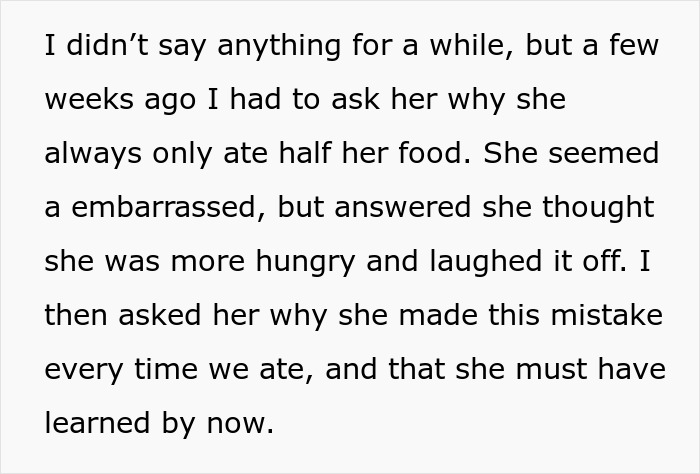
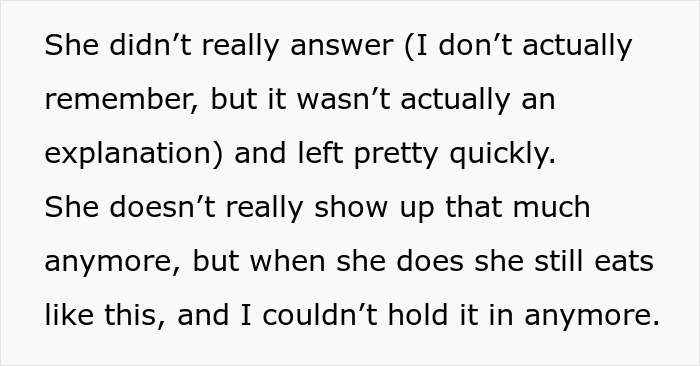


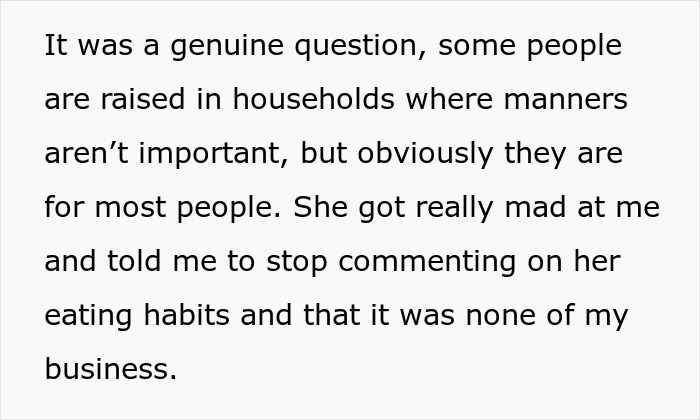

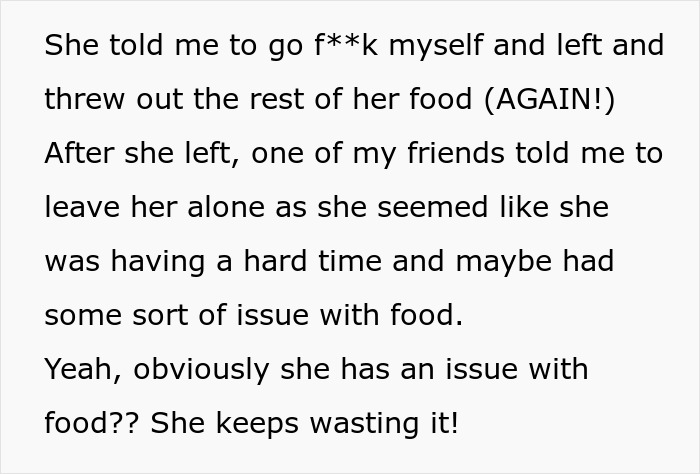

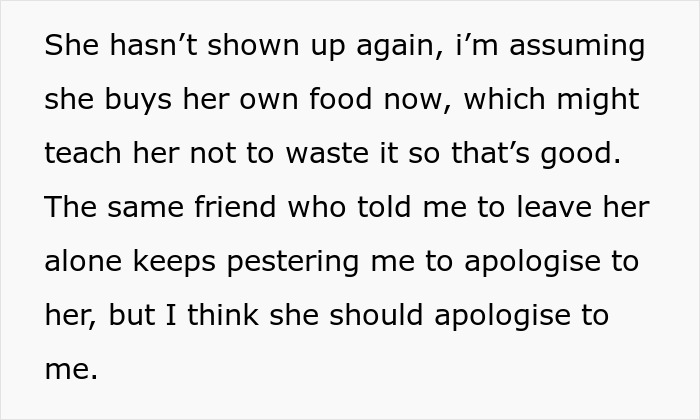
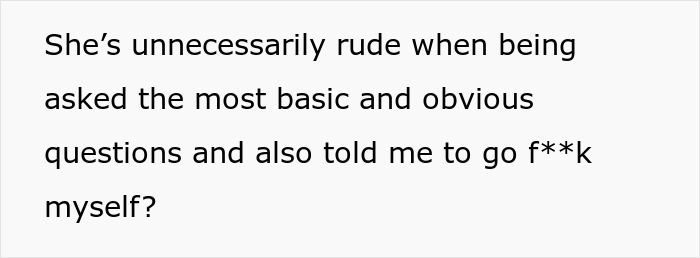
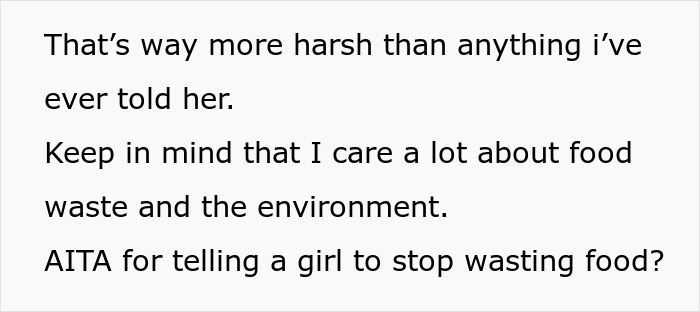
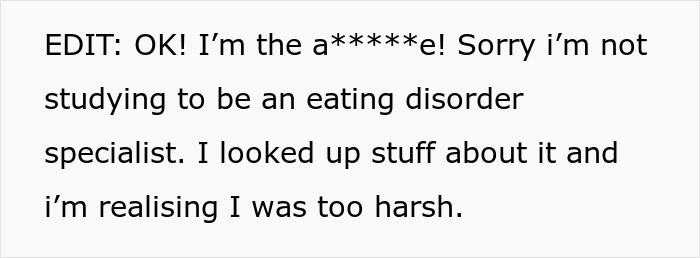
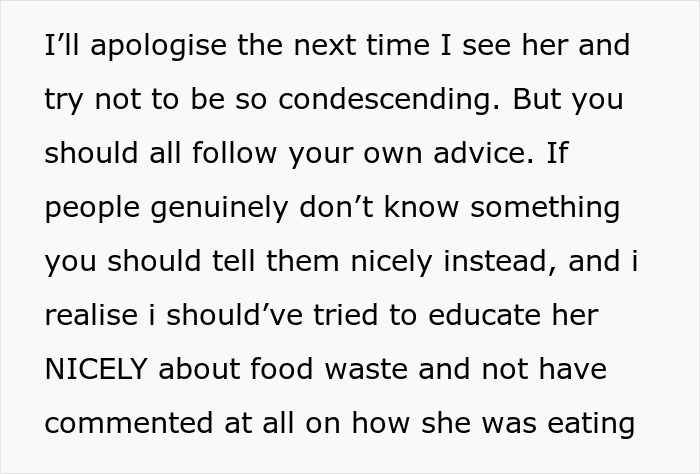





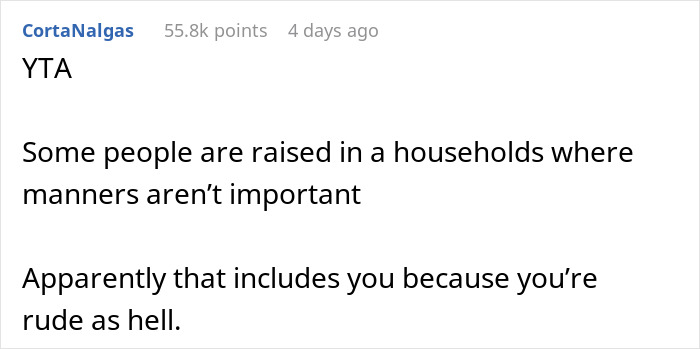
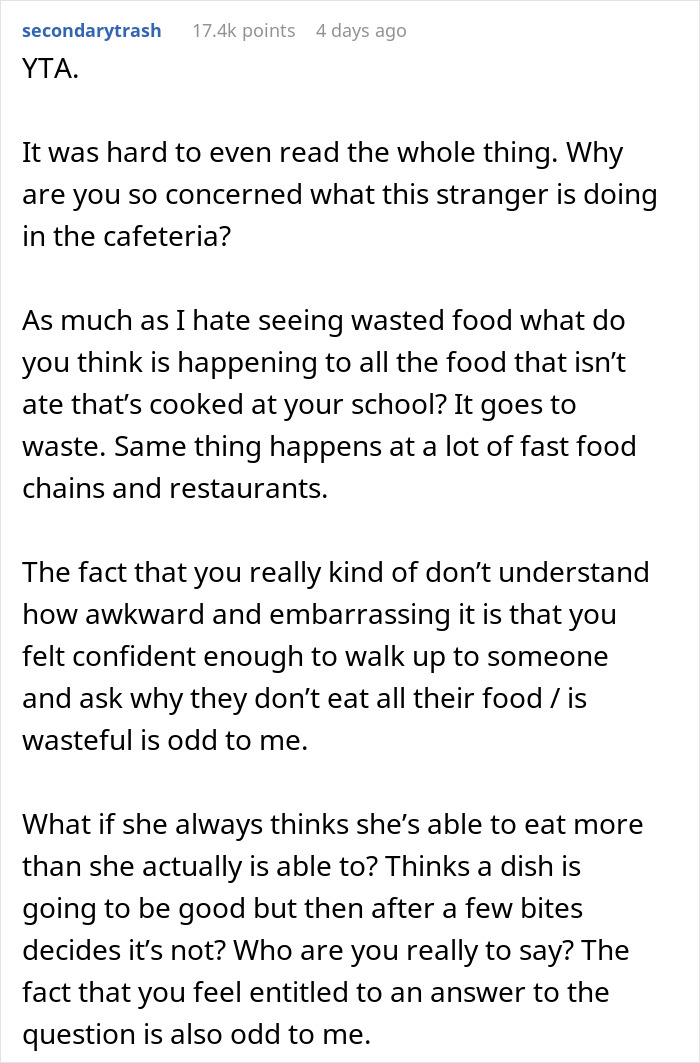



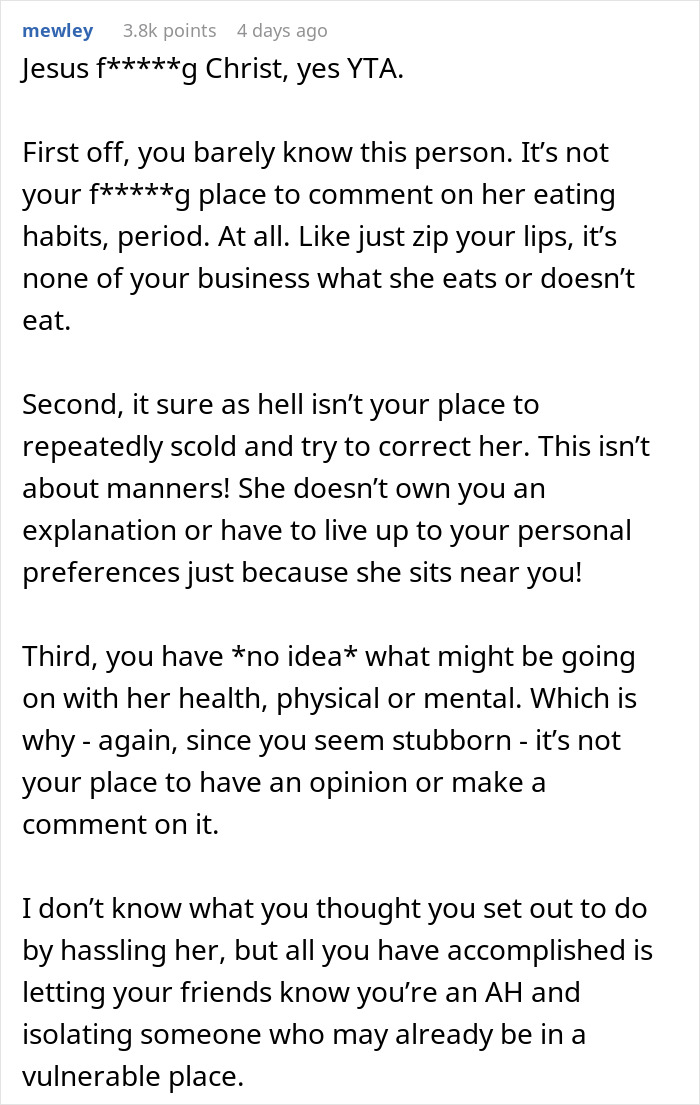
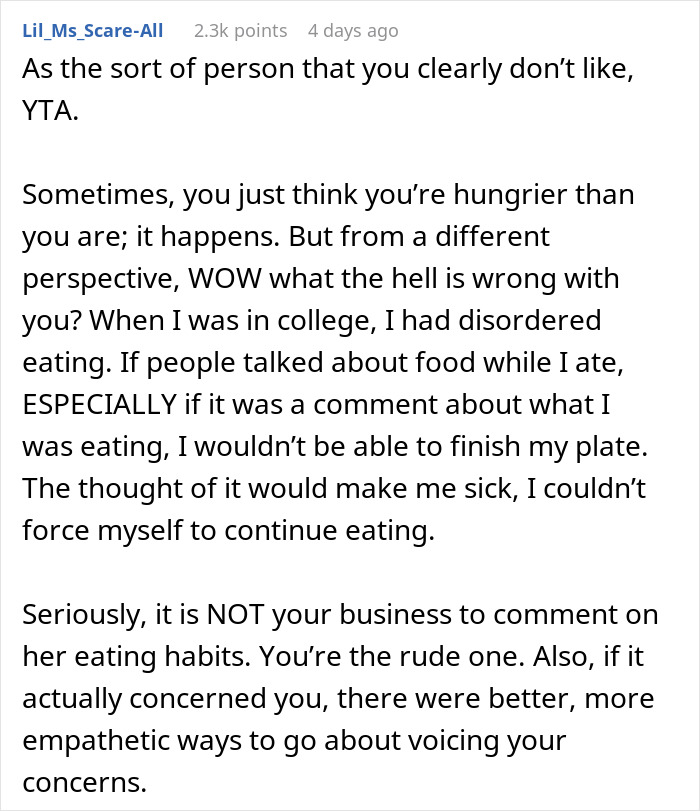

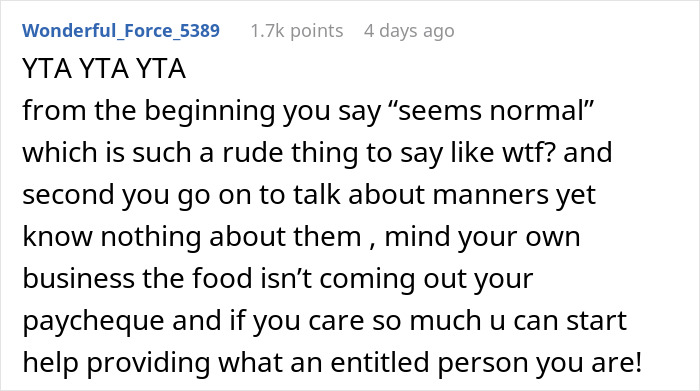
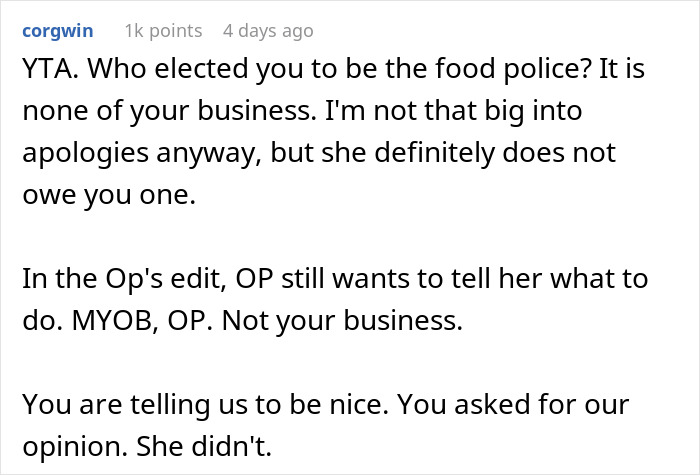
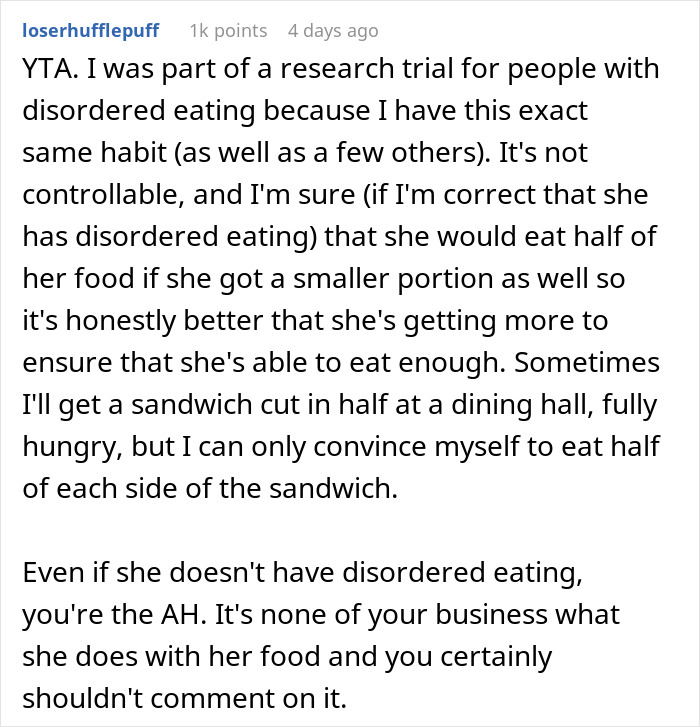
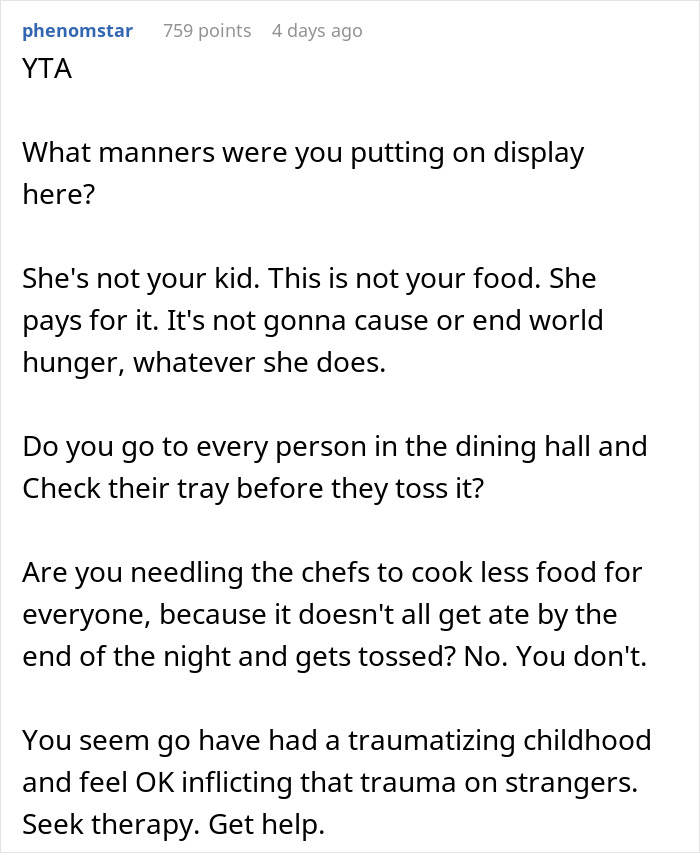
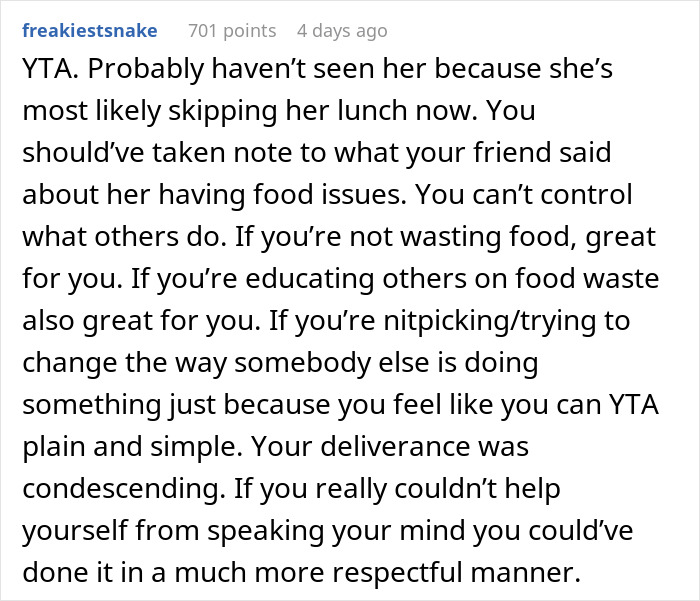

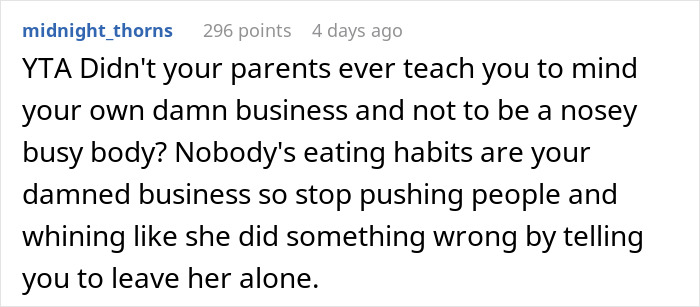
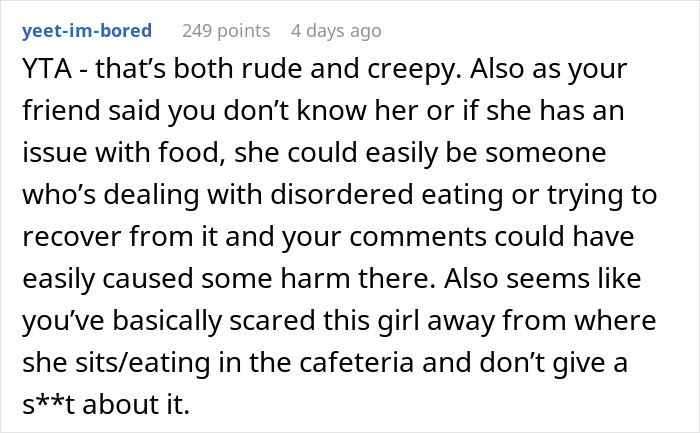

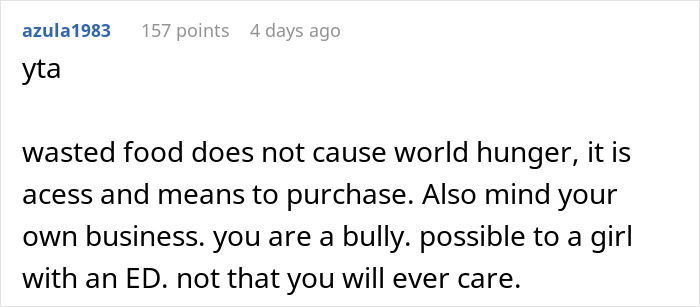





88
155